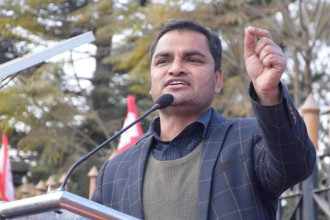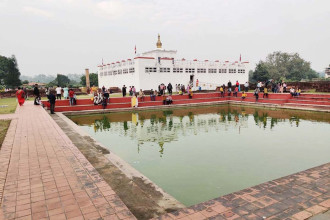-1758457452.jpg)
KATHMANDU: Private sector has expressed deep sorrow over damage to industrial and commercial establishments during the Gen Z protest and has committed not to give up.
Private sector representatives met Prime Minister Sushila Karki today, expressing confidence they will emerge even stronger. Federation of Nepalese Chambers of Commerce and Industry President Chandra Prasad Dhakal said the sector has suffered a major setback owing to vandalism and arson attacks.
“According to initial estimates, the damage is from Rs 80 billion to Rs 100 billion. However, we will not sit in despair; we will rise again,” Dhakal said, adding that no government since 2046 BS has understood the real needs and pain of private sector.
“The perspective of political parties and the general public has not yet improved. We should be seen not just as profit-making entities, but as a sector that creates jobs, increases production and strengthens the economy,” he said. He expressed suspicion that this time, looting and arson may have been carried out by individuals not associated with the Gen Z movement.
“This is not merely an effect of the protest, but intentional looting and arson. Those involved in such acts must be investigated and immediately brought to legal accountability,” Dhakal added.
The FNCCI said the incident had brought the private sector to “zero” and demanded immediate concrete steps from the state. Businesspersons also emphasised the need to make legal provisions on corporate social responsibility (CSR) more practical.
“Last year alone, banks and financial institutions (BFIs) spent about Rs 70 billion, but unnecessary restrictions on where to spend meant they could not invest in areas of real need. Arrangements should now be made so that CSR expenses can also be applied to the security sector,” Dhakal said.
Confederation of Nepalese Industries (CNI) President Birendra Raj Pandey said private sector is hardest hit at every stage of protests for political change.
-1758457454.jpg)
-1758457451.jpg)
“In every protest, the private sector incurs great losses, but provisions to bring those who cause damage to legal accountability are not yet effective. Special relief and subsidised loans are needed to boost the morale of the private sector,” he said.
Pandey also stressed the need to streamline the insurance payment system to facilitate compensation for damages. He urged the government to prepare and implement short-, medium- and long-term strategies aimed at the private sector, guaranteeing good governance and public security.
Federation of Nepal Cottage and Small Industries (FNCSI) President Umesh Singh said there are about 950,000 micro and small industries nationwide, of which about 500,000 have not yet renewed their licences.
“A one-off exemption on renewal fees should be given to small and medium industries that have not been able to renew. A large number still operate informally. If the state provides relief, registration and renewal will be easier,” he said. Pointing to the need for financial strength to run industries and businesses, he suggested expanding the scope of insurance.
“In every difficulty, the private sector stands with the government. We have supported the government during crises. But now, the government should not view domestic, micro and small industries in the same way as large ones; it should give them separate priority and provide facilities for loans, interest rates and subsidies,” Singh said. He expressed confidence that targeted policies for small industries would contribute to job creation and increase local production.
Nepal Chamber of Commerce (NCC) President Kamlesh Kumar Agrawal said the attack on industries and businesses is unfortunate and urged the government to introduce a special integrated security plan to protect property and instil confidence among investors. He said the situation has hurt not only investors but also entrepreneurs’ morale. Agrawal called for waivers on income tax and value added tax (VAT), subsidised loans and an “integrated economic plan” to create employment for youth within the country.
Federation of Contractors’ Associations of Nepal (FCAN) President Rabi Singh described the current protest as a reaction against disappointment and corruption. He said the government should take the initiative to build a corruption-free Nepal ahead of the election. Singh welcomed the finance minister’s plan to identify resources by cancelling some budget projects and suggested abolishing consumer committees.
(With inputs from RSS)





-1770295070.jpeg)
